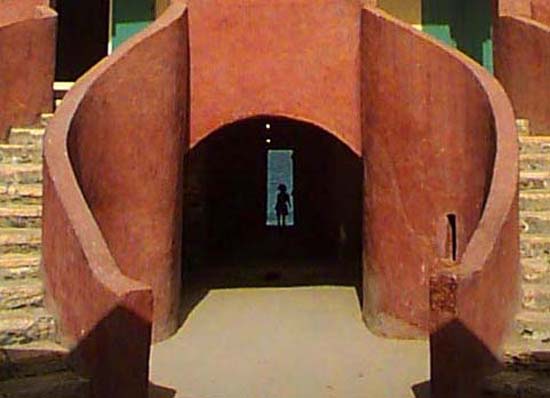2006.04.03: April 3, 2006: Headlines: COS - Senegal: Blogs - Senegal: Training: Personal Web Site: Senegal Peace Corps Volunteer Heather writes: Peace Corps has all new volunteers do a demystification visit during their first week in the country
Peace Corps Online:
Directory:
Senegal:
Peace Corps Senegal :
The Peace Corps in Senegal:
2006.04.03: April 3, 2006: Headlines: COS - Senegal: Blogs - Senegal: Training: Personal Web Site: Senegal Peace Corps Volunteer Heather writes: Peace Corps has all new volunteers do a demystification visit during their first week in the country
Senegal Peace Corps Volunteer Heather writes: Peace Corps has all new volunteers do a demystification visit during their first week in the country

"I went to Kaffrin with another girl from my stage (group of volunteers who started at the same time), and we stayed with Anne, an urban agriculture volunteer. I expect my work will be similar to hers. On the first day she took us to the market for bean sandwiches and grocery shopping. This was a shocking experience. The market is a hot, crowded, loud, fish-smelling series of stands where people sell vegetables, fish, fabric, sandals, and other things. The stands are generally just tables on which the salable items are displayed in piles. Because I would not push people or force my way forward, I kept getting separated from the others. We went to the market every morning, and gradually I got used to the sites. An elderly man who sells vegetables likes to joke with Anne about her being his wife. When he saw Anne with two new females he broke into praises to Allah for giving him three wives, and he hollered threats at all nearby men lest they look at his wives."
Senegal Peace Corps Volunteer Heather writes: Peace Corps has all new volunteers do a demystification visit during their first week in the country
Monday, April 03, 2006
March 29
[Excerpt]
This is a four night five day visit to a volunteer who has been serving in Senegal for one year. Peace Corps has all new volunteers do a demystification visit during their first week in the country. It is a wonderful idea. I went to Kaffrin with another girl from my stage (group of volunteers who started at the same time), and we stayed with Anne, an urban agriculture volunteer. I expect my work will be similar to hers. On the first day she took us to the market for bean sandwiches and grocery shopping. This was a shocking experience. The market is a hot, crowded, loud, fish-smelling series of stands where people sell vegetables, fish, fabric, sandals, and other things. The stands are generally just tables on which the salable items are displayed in piles. Because I would not push people or force my way forward, I kept getting separated from the others. We went to the market every morning, and gradually I got used to the sites. An elderly man who sells vegetables likes to joke with Anne about her being his wife. When he saw Anne with two new females he broke into praises to Allah for giving him three wives, and he hollered threats at all nearby men lest they look at his wives.
Anne took us to some gardens where she has been working and giving advice. One garden was thriving, another contained nothing living save the mule who was looking for food therein, and a third was a new garden with short green sprouts of bissap plants. This last garden is a cooperative belonging to some local women. They have been having problems with their top soil drying, and they asked Anne for advice. She gave an impromptu lecture on ground covering techniques. I could not understand a word of it, but the fact that she, a girl like me, having just a bachelors, a few years of work experience, and the Peace Corps training, is able to give valuable advice to Senegalese gardeners, has made me very optimistic about the likelihood that I will have something to offer the folks of my village.
Demyst also exposed me to the heat. Anne says the seasons are hot, hot and humid, hot hot, and so hot you wish you were dead. As I lay on the floor wilting in front of her fan, which was useless due to the lack of electricity, she said this weather was only hot. I would have opted for a small village if given the choice, but I think I will be going to a city. It will probably have electricity. I have plans to buy the first fan I can find, and to have a refrigerator that is always stocked with oranges.
A day after demyst the homestay began. Each volunteer was given a cue-card on which was a Senegalese name. Likewise, each Senegalese family had a cue-card with a volunteerís name. At the sound of the drum we came running from opposite directions trying to find matches and then embracing. I now live with a family of seven. There is a husband, one wife (some families here do have more), and five children, ranging from six months to seventeen years of age. The four year old likes to climb on me and cover my papers with her hands while Iím studying. I am told she is testing me. I firmly objected when she began sticking fingers in my ear, but otherwise I am having a hard time disciplining her. My Senegalese mother told me that because I will be here for another two months, and because the girl is my sister, I really must learn to control her. She suggested I pinch her ears. When she shrieks at me while Iím trying to learn Fulakunnda, I imagine things much more satisfying than merely tweaking her ears, but I would no more be welcome in the house if I indulged myself. I get along well with the other kids, and the mother is very affectionate and patient with me. She checks on my homework, noodges me to move quickly in the morning, and has had to remind me to comb my hair. Being in the house makes me home sick, but otherwise it is fine.
Especially nice moments with the family include practicing vocab with the eleven year old girl in the backyard in a cool windy spot, dancing and singing with the eldest daughter, and walking arm-in-arm with the mother.
The neighbors are very friendly. As I walked home from the bus stop today I greeted everyone I saw, and often this led to more people coming outside to say hello and laugh with me about my limited Fulakunnda. A few of them admitted to having watched me this week. I have been singing, dancing, and doing push-ups at the bus stop, thinking I was alone.
Iím in a phase of Peace Corps now called PST (pre-service training). This is a two month intense and constant schooling process. By the end of this period I should have good language, cross-cultural, and agricultural skills. Today I spent 5.5 hours in language class. There is one other student. The class is taught in French. This was the third day of language classes. One girl got up and walked out of her Pulaar class in tears today, returning only after a five-minute walk and a self-pep-talk. Somewhere around the fourth hour I told my teacher, in my broken French, that my brain had exploded. He let us take a five minute break. Around the fifth hour the stress of trying to place random syllables that are newly floating in my head into an order that makes sense according to some grammar rules that have yet to be spoken of made me to burst into a laughing fit bordering on hysteria. It turns out similar things were happening in all the classes. Tomorrow we have only 2 hours of language. I do wonder at the reasoning behind the schedule.
Links to Related Topics (Tags):
Headlines: April, 2006; Peace Corps Senegal; Directory of Senegal RPCVs; Messages and Announcements for Senegal RPCVs; Blogs - Senegal; Training
When this story was posted in December 2006, this was on the front page of PCOL:





Peace Corps Online The Independent News Forum serving Returned Peace Corps Volunteers
 | All Volunteers Safe in Fiji
All Volunteers in Fiji are safe and accounted for. The Peace Corps is monitoring the situation very closely. Volunteers are on standfast but there are no plans for evacuation at this time. Peace Corps is working closely with the US embassy and with host country partners to monitor the situation. Peace Corps is confident that volunteers are not in harm's way. The military seized control of Fiji on December 5 after weeks of threats. Subscribe to our news feed to read the latest breaking news. |
 | Ron Tschetter in Morocco and Jordan
On his first official trip since being confirmed as Peace Corps Director, Ron Tschetter (shown at left with PCV Tia Tucker) is on a ten day trip to Morocco and Jordan. Traveling with his wife (Both are RPCVs.), Tschetter met with volunteers in Morocco working in environment, youth development, health, and small business development. He began his trip to Jordan by meeting with His Majesty King Abdullah II and Her Majesty Queen Rania Al Abdullah and discussed expanding the program there in the near future. |
 | Chris Dodd's Vision for the Peace Corps
Senator Chris Dodd (RPCV Dominican Republic) spoke at the ceremony for this year's Shriver Award and elaborated on issues he raised at Ron Tschetter's hearings. Dodd plans to introduce legislation that may include: setting aside a portion of Peace Corps' budget as seed money for demonstration projects and third goal activities (after adjusting the annual budget upward to accommodate the added expense), more volunteer input into Peace Corps operations, removing medical, healthcare and tax impediments that discourage older volunteers, providing more transparency in the medical screening and appeals process, a more comprehensive health safety net for recently-returned volunteers, and authorizing volunteers to accept, under certain circumstances, private donations to support their development projects. He plans to circulate draft legislation for review to members of the Peace Corps community and welcomes RPCV comments. |
 | He served with honor
One year ago, Staff Sgt. Robert J. Paul (RPCV Kenya) carried on an ongoing dialog on this website on the military and the peace corps and his role as a member of a Civil Affairs Team in Iraq and Afghanistan. We have just received a report that Sargeant Paul has been killed by a car bomb in Kabul. Words cannot express our feeling of loss for this tremendous injury to the entire RPCV community. Most of us didn't know him personally but we knew him from his words. Our thoughts go out to his family and friends. He was one of ours and he served with honor. |
 | Peace Corps' Screening and Medical Clearance
The purpose of Peace Corps' screening and medical clearance process is to ensure safe accommodation for applicants and minimize undue risk exposure for volunteers to allow PCVS to complete their service without compromising their entry health status. To further these goals, PCOL has obtained a copy of the Peace Corps Screening Guidelines Manual through the Freedom of Information Act (FOIA) and has posted it in the "Peace Corps Library." Applicants and Medical Professionals (especially those who have already served as volunteers) are urged to review the guidelines and leave their comments and suggestions. Then read the story of one RPCV's journey through medical screening and his suggestions for changes to the process. |
 | The Peace Corps is "fashionable" again
The LA Times says that "the Peace Corps is booming again and "It's hard to know exactly what's behind the resurgence." PCOL Comment: Since the founding of the Peace Corps 45 years ago, Americans have answered Kennedy's call: "Ask not what your country can do for you--ask what you can do for your country. My fellow citizens of the world: ask not what America will do for you, but what together we can do for the freedom of man." Over 182,000 have served. Another 200,000 have applied and been unable to serve because of lack of Congressional funding. The Peace Corps has never gone out of fashion. It's Congress that hasn't been keeping pace. |
 | PCOL readership increases 100%
Monthly readership on "Peace Corps Online" has increased in the past twelve months to 350,000 visitors - over eleven thousand every day - a 100% increase since this time last year. Thanks again, RPCVs and Friends of the Peace Corps, for making PCOL your source of information for the Peace Corps community. And thanks for supporting the Peace Corps Library and History of the Peace Corps. Stay tuned, the best is yet to come. |
 | History of the Peace Corps
PCOL is proud to announce that Phase One of the "History of the Peace Corps" is now available online. This installment includes over 5,000 pages of primary source documents from the archives of the Peace Corps including every issue of "Peace Corps News," "Peace Corps Times," "Peace Corps Volunteer," "Action Update," and every annual report of the Peace Corps to Congress since 1961. "Ask Not" is an ongoing project. Read how you can help. |
Read the stories and leave your comments.

Some postings on Peace Corps Online are provided to the individual members of this group without permission of the copyright owner for the non-profit purposes of criticism, comment, education, scholarship, and research under the "Fair Use" provisions of U.S. Government copyright laws and they may not be distributed further without permission of the copyright owner. Peace Corps Online does not vouch for the accuracy of the content of the postings, which is the sole responsibility of the copyright holder.
Story Source: Personal Web Site
This story has been posted in the following forums: : Headlines; COS - Senegal; Blogs - Senegal; Training
PCOL35468
50



















